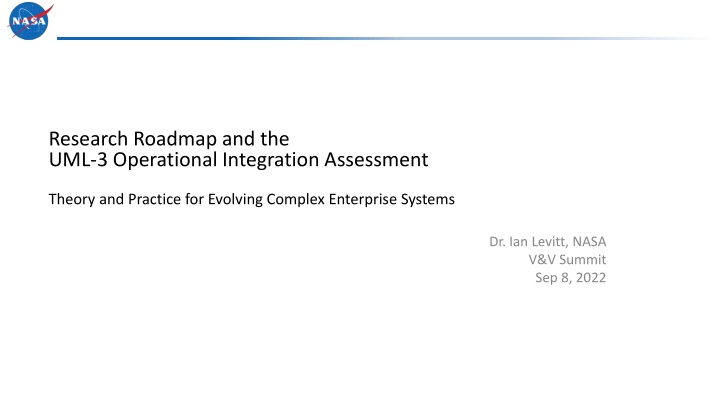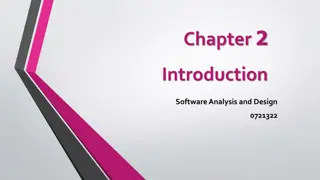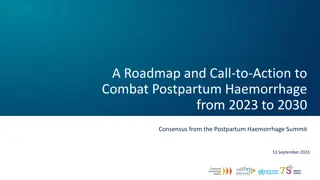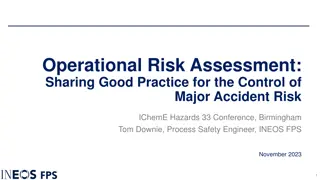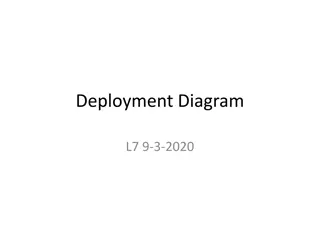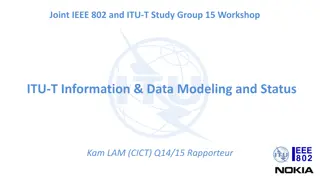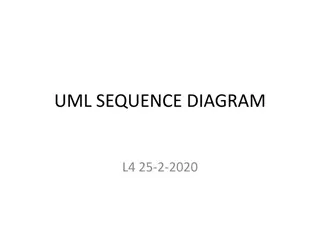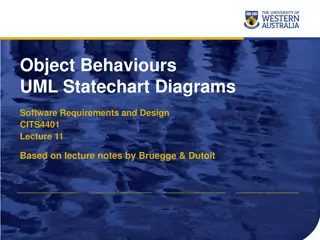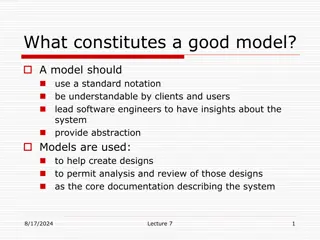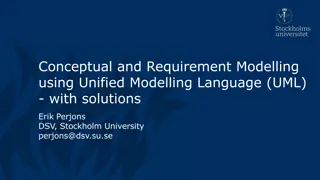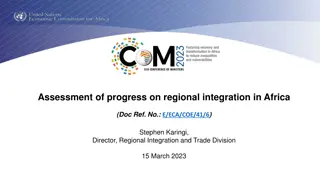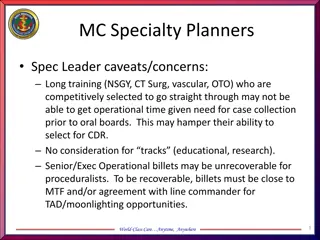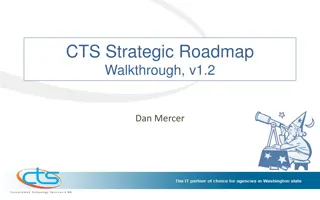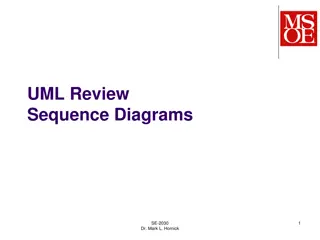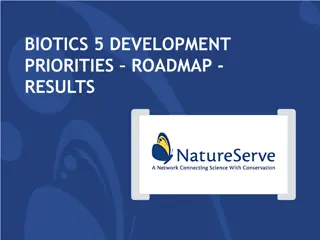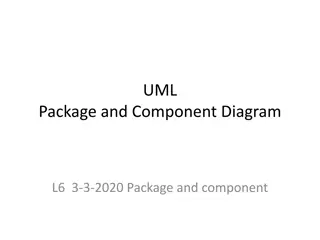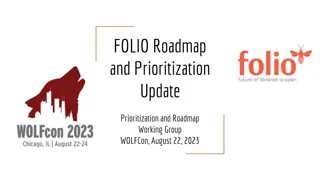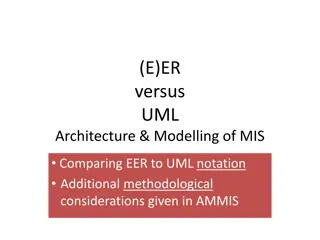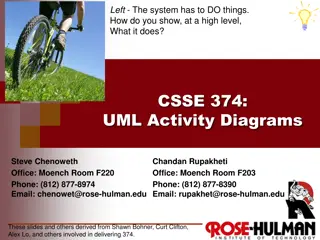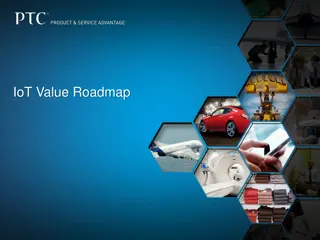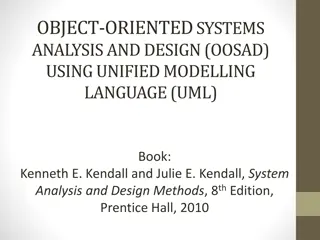Research Roadmap and the UML-3 Operational Integration Assessment
A research roadmap is a living document that guides the progression of complex system capabilities through high-level requirements, assumptions, and constraints. It provides valuable insights for evolving enterprise systems. The integration of UML-3 operational assessment theory facilitates the development of advanced digital engineering methodologies, enhancing the refinement of complex systems. This comprehensive approach, exemplified in the context of NASA's V&V Summit, underscores the importance of systematic planning and execution in evolving enterprise systems.
Download Presentation

Please find below an Image/Link to download the presentation.
The content on the website is provided AS IS for your information and personal use only. It may not be sold, licensed, or shared on other websites without obtaining consent from the author.If you encounter any issues during the download, it is possible that the publisher has removed the file from their server.
You are allowed to download the files provided on this website for personal or commercial use, subject to the condition that they are used lawfully. All files are the property of their respective owners.
The content on the website is provided AS IS for your information and personal use only. It may not be sold, licensed, or shared on other websites without obtaining consent from the author.
E N D
Presentation Transcript
Research Roadmap and the UML-3 Operational Integration Assessment Theory and Practice for Evolving Complex Enterprise Systems Dr. Ian Levitt, NASA V&V Summit Sep 8, 2022
What is a Research Roadmap? A living document that describes how research informs the progression of complex system capabilities By way of high-level Requirements Assumptions Constraints 3
What is a Research Roadmap? A living document that describes how research informs the progression of complex system capabilities By way of high-level Requirements Assumptions Constraints Not really a Roadmap! Does not use timeframes Includes contradictions found in research Roadmaps can be extracted 4
Under-the-hood System Engineering Digital Engineering methodology Traces to research through requirements hierarchy Analyzes requirements for research insights Provides dashboard reports for program management CNS = Communication, Navigation, and Surveillance UML = UAM Maturity Level 5
UAM Airspace Research Roadmap v1.2 PRACTICE 6
UAM Airspace Research Roadmap Development Oct 2020 Jan 2021 Apr 2021 June 2021 Oct 2021 Jan 2022 Apr 2022 June 2022 Oct 2022 Jan 2023+ V1.0 NASA Technical Memo Started NASA-Informed 7
UAM Airspace Research Roadmap Development Oct 2020 Jan 2021 Apr 2021 June 2021 Oct 2021 Jan 2022 Apr 2022 June 2022 Oct 2022 Jan 2023+ V1.1 NASA-FAA review V1.0 NASA Technical Memo Started NASA-Informed FAA-Informed 8
UAM Airspace Research Roadmap Development 1 Introduction 2 UAM Airspace System Definition 3 UAM Airspace System Progression 4 System Engineering Methodology 5 Roadmap Requirements Tables 6 Conclusions and Next Steps References Appendix A: Acronyms Appendix B: Glossary https://nari.arc.nasa.gov/uam-research-roadmap Oct 2020 Jan 2021 Apr 2021 June 2021 Oct 2021 Jan 2022 Apr 2022 June 2022 Oct 2022 Jan 2023+ V1.1 NASA-FAA review V1.2 NASA Technical Memo V1.0 NASA Technical Memo Started Community-Informed NASA-Informed FAA-Informed 9
UAM Airspace Research Roadmap Development 1 Introduction 2 UAM Airspace System Definition 3 UAM Airspace System Progression 4 System Engineering Methodology 5 Roadmap Requirements Tables 6 Conclusions and Next Steps References Appendix A: Acronyms Appendix B: Glossary https://nari.arc.nasa.gov/uam-research-roadmap Oct 2020 Jan 2021 Apr 2021 June 2021 Oct 2021 Jan 2022 Apr 2022 June 2022 Oct 2022 Jan 2023+ V1.1 NASA-FAA review V1.2 NASA Technical Memo V1.0 NASA Technical Memo V2.0 Baseline Started Community-Informed NASA-Informed FAA-Informed 10
System Engineering Methodology UAM System of Systems partially decomposed into capabilities that cover the airspace system
System Engineering Methodology UML-1:Pre- Operational UML-2:Initial - eVTOL introduced - Initial Data Collection UAM System of Systems Capabilities evolve over time UML-3:Transition and Growth - Vertiports, PSUs new airspace constructs - Extensive data collection UML-4:New Predetermined Separator - New mode of operation - ATC is not the separator 12
System Engineering Methodology Airspace Mgmt Airspace Design Regulations & Policies Communications UAM System of Systems Navigation Enterprise decomposed into capabilities that cover the airspace system Secured Airspace Separation Services Surveillance Vertiport Operations Weather 13
System Engineering Methodology Airspace Mgmt Airspace Design Regulations & Policies Communications UAM System of Systems Navigation Enterprise decomposed into capabilities that cover the airspace system Secured Airspace Separation Services Surveillance Vertiport Operations Weather 14
System Engineering Methodology Progress of Time Airspace Mgmt Airspace Design Research Assumptions Regulations & Policies will Communications UAM System of Systems Navigation Enterprise decomposed into capabilities that cover the airspace system Secured Airspace Separation Services Surveillance Vertiport Operations Weather 15
System Engineering Methodology Progress of Time Airspace Mgmt Airspace Design Research Assumptions Regulations & Policies will Communications Research Requirements shall/should UAM System of Systems Navigation Enterprise decomposed into capabilities that cover the airspace system Secured Airspace Operational and Functional Separation Services Surveillance Vertiport Operations Weather 16
System Engineering Methodology Progress of Time Airspace Mgmt Airspace Design Research Assumptions Regulations & Policies will Communications Research Requirements shall/should UAM System of Systems Navigation Enterprise decomposed into capabilities that cover the airspace system Secured Airspace Operational and Functional Separation Services TBR Surveillance Vertiport Operations Weather 17
4 System Engineering Methodology Progress of Time Airspace Mgmt Airspace Design Research Assumptions Regulations & Policies will Communications Research Requirements shall/should UAM System of Systems Navigation Enterprise decomposed into capabilities that cover the airspace system Secured Airspace Operational and Functional Separation Services TBR Surveillance Vertiport Operations Weather Tables 18
Digital Engineering for Research THEORY 19
Development of a Research System Identify/Discover requirements and flow- down to implementation of research system Helps identify: comprehensive set of capabilities dependencies and interoperability 20
Integration of Research Results Execute research to identify new requirements, and refine existing requirements Research results validate and mature the requirements 21
X5 & UML-3 Operational integration assessment (OIA) PRACTICE 22
UAM Airspace Subprojects Future Efforts Ongoing/Upcoming Applications 23
UML-3 Cooperative Conflict Management (CCM) Concept Cooperative Conflict Management addresses scalability through new ATM paradigms that distribute the responsibility for Conflict Management amongst cooperative actors Relies on common situation awareness, common operating picture UML-3 will be in IFR or VFR, with novel procedures enabling increased tempo Notional Conflict Management Diagram Developed by NASA/Maria Consiglio 24
UML-3 Cooperative Conflict Management (CCM) Concept VFR: managed flow of UAM traffic for increased throughput, extending below VMC, with acceptable pilot workload Cooperative Conflict Management addresses scalability through new ATM paradigms that distribute the responsibility for Conflict Management amongst cooperative actors Relies on common situation awareness, common operating picture UML-3 will be in IFR or VFR, with novel procedures enabling increased tempo Notional Conflict Management Diagram Developed by NASA/Maria Consiglio 25
UML-3 Cooperative Conflict Management (CCM) Concept VFR: managed flow of UAM traffic for increased throughput, extending below VMC, with acceptable pilot workload Cooperative Conflict Management addresses scalability through new ATM paradigms that distribute the responsibility for Conflict Management amongst cooperative actors Relies on common situation awareness, common operating picture UML-3 will be in IFR or VFR, with novel procedures enabling increased tempo IFR: efficient and predictable flow of UAM operations, with acceptable ATC workload at sustained tempos Notional Conflict Management Diagram Developed by NASA/Maria Consiglio 26
UML-3 Technical and Operational R&D Tactical Conflict Management (X5) Implement automation to support Cooperative Conflict Management Strategic and Tactical for UML-3 Interoperability tested through simulation and analysis Assess the effectiveness of the total system 27
UML-3 Technical and Operational R&D UML-3 Operational Integration Assessment (OIA) Tactical Conflict Management (X5) Integrate X5 capabilities into a higher- TRL operational environment Joint NASA/FAA integrated LVC Most system actors represented Integrate UAM and non-UAM traffic Novel airspace constructs Off-nominal scenarios Key objectives Accelerate UML-3 Operationalization Evaluate innovative solutions for operational integration Evaluate and explore ATM, Flight Crew, and Operator functions Identify barriers associated with progressing operations from VMC to IMC Implement automation to support Cooperative Conflict Management Strategic and Tactical for UML-3 Interoperability tested through simulation and analysis Assess the effectiveness of the total system 28
UML-3 Technical and Operational R&D UML-3 Operational Integration Assessment (OIA) Tactical Conflict Management (X5) Integrate X5 capabilities into a higher- TRL operational environment Joint NASA/FAA integrated LVC Most system actors represented Integrate UAM and non-UAM traffic Novel airspace constructs Off-nominal scenarios Key objectives Accelerate UML-3 Operationalization Evaluate innovative solutions for operational integration Evaluate and explore ATM, Flight Crew, and Operator functions Identify barriers associated with progressing operations from VMC to IMC Implement automation to support Cooperative Conflict Management Strategic and Tactical for UML-3 Interoperability tested through simulation and analysis Assess the effectiveness of the total system Traces to broad set of research requirements and assumptions 29
Requirements Development X5 / OIA research requirements 30
Integration of Research Results X5 / OIA research results 31
Agile Requirements Development Continuous process of requirements discovery and research system test & evaluation X5 / OIA research requirements X5 / OIA research results 32
Next Steps Practice Baseline UAM Airspace Research Roadmap v2.0 in Jan 2023 Build out database of research results Apply AI/ML techniques to increase efficiency of the researcher, program manager, and system engineer Apply process to next 5-8 years of ATM-X UAM Subproject research Theory Develop concept of operations for Knowledge-based Digital Platform Study transportation system enterprise and its sectors 33
